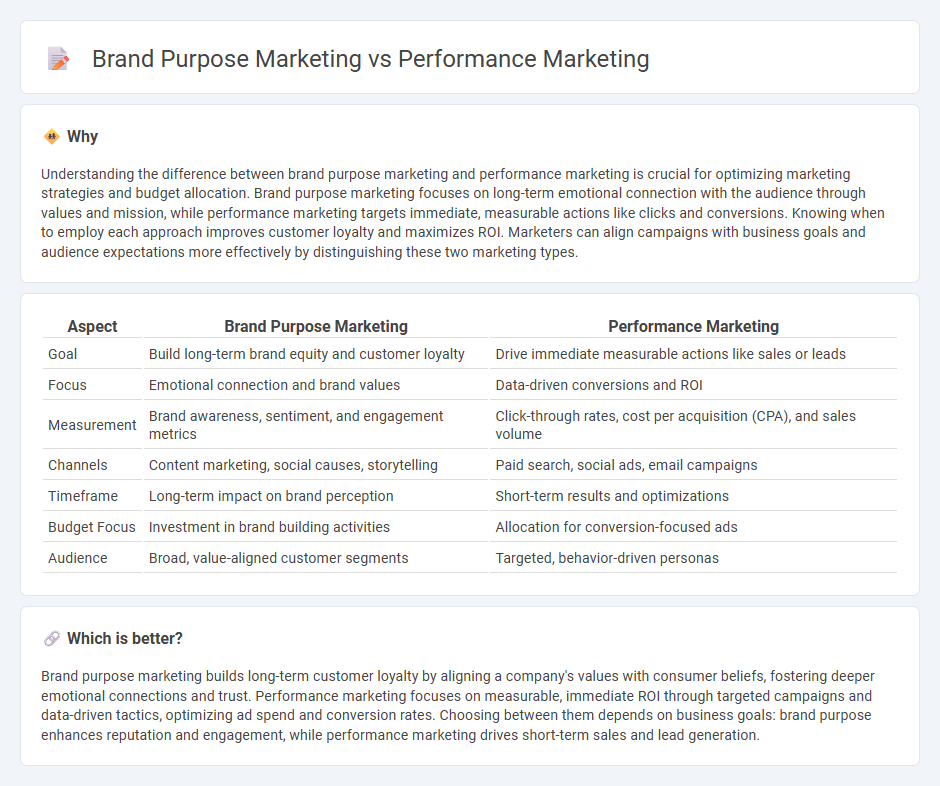
Brand purpose marketing focuses on building long-term emotional connections by aligning campaigns with a company's core values and social impact initiatives, enhancing customer loyalty and brand reputation. Performance marketing prioritizes measurable results through targeted advertising strategies, leveraging data analytics to optimize conversions and maximize return on investment. Explore the key differences and benefits of each approach to elevate your marketing strategy.
Why it is important
Understanding the difference between brand purpose marketing and performance marketing is crucial for optimizing marketing strategies and budget allocation. Brand purpose marketing focuses on long-term emotional connection with the audience through values and mission, while performance marketing targets immediate, measurable actions like clicks and conversions. Knowing when to employ each approach improves customer loyalty and maximizes ROI. Marketers can align campaigns with business goals and audience expectations more effectively by distinguishing these two marketing types.
Comparison Table
| Aspect | Brand Purpose Marketing | Performance Marketing |
|---|---|---|
| Goal | Build long-term brand equity and customer loyalty | Drive immediate measurable actions like sales or leads |
| Focus | Emotional connection and brand values | Data-driven conversions and ROI |
| Measurement | Brand awareness, sentiment, and engagement metrics | Click-through rates, cost per acquisition (CPA), and sales volume |
| Channels | Content marketing, social causes, storytelling | Paid search, social ads, email campaigns |
| Timeframe | Long-term impact on brand perception | Short-term results and optimizations |
| Budget Focus | Investment in brand building activities | Allocation for conversion-focused ads |
| Audience | Broad, value-aligned customer segments | Targeted, behavior-driven personas |
Which is better?
Brand purpose marketing builds long-term customer loyalty by aligning a company's values with consumer beliefs, fostering deeper emotional connections and trust. Performance marketing focuses on measurable, immediate ROI through targeted campaigns and data-driven tactics, optimizing ad spend and conversion rates. Choosing between them depends on business goals: brand purpose enhances reputation and engagement, while performance marketing drives short-term sales and lead generation.
Connection
Brand purpose marketing builds long-term customer trust and emotional connection by emphasizing a company's core values and social impact, which enhances brand loyalty and reputation. Performance marketing focuses on measurable outcomes and ROI through targeted campaigns, utilizing data analytics to optimize customer acquisition and conversion rates. Together, integrating brand purpose with performance marketing creates a holistic strategy that drives both meaningful engagement and scalable business growth.
Key Terms
**Performance Marketing:**
Performance marketing emphasizes measurable outcomes such as click-through rates, conversion rates, and return on ad spend (ROAS) to drive immediate sales and customer acquisition. It leverages data-driven strategies, real-time analytics, and targeted campaigns to optimize advertising efficiency across digital channels like social media, search engines, and affiliate networks. Explore how integrating performance marketing can amplify your brand's growth and ROI.
ROI (Return on Investment)
Performance marketing prioritizes measurable ROI through targeted campaigns, leveraging data-driven strategies like pay-per-click (PPC) ads, conversion tracking, and A/B testing to optimize customer acquisition and sales outcomes. Brand purpose marketing emphasizes building long-term emotional connections and brand loyalty by aligning with social values and mission-driven narratives, which may not yield immediate ROI but foster sustainable growth. Explore how integrating both approaches can maximize your marketing effectiveness and financial returns.
Conversion Rate
Performance marketing centers on driving immediate actions such as clicks and purchases, with Conversion Rate Optimization (CRO) playing a crucial role in measuring campaign effectiveness through precise data analytics and targeted ad strategies. Brand purpose marketing emphasizes long-term emotional connections, aligning brand values with consumer identity to foster loyalty, where conversion rates may manifest in brand engagement rather than direct sales metrics. Explore deeper insights into how balancing these approaches can maximize both short-term results and sustained customer relationships.
Source and External Links
What Is Performance Marketing? Definition and Beginner's Guide - Performance marketing is a results-driven digital marketing strategy where advertisers pay only when measurable actions like clicks, leads, or sales occur, enabling clear tracking and optimization of campaigns based on their performance.
Performance-based advertising - Also known as pay-for-performance advertising, performance marketing focuses on paying only when specific measurable results such as an acquisition or sale are completed, distinguishing it from brand marketing which aims at awareness and long-term engagement.
What is Performance Marketing, & How Does it Work? - Performance marketing allows businesses to optimize ad spend by paying only for completed actions (clicks, leads, sales), offering real-time tracking and adjustment to maximize ROI, and complementing brand marketing efforts focused on long-term relationships.
 dowidth.com
dowidth.com